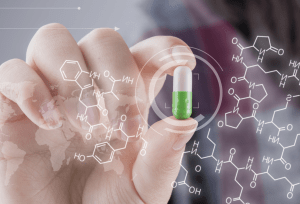Artificial Intelligence is transforming the pharmaceutical industry by solving old problems in drug development and clinical trial rules. This article shows how AI is changing the field.
Introduction: Challenges in Pharma and the Rise of AI
Developing a new drug usually takes more than ten years and costs a lot of money. Clinical trials are a key step, but they often fail and face many complex regulations. AI can help with these issues. It can speed up drug development and make it easier to follow the rules.
How AI Is Reshaping the Drug Development Pipeline
AI algorithms are able to create new molecules and predict the effects they will have on the body. This allows for quicker drug discovery, and eliminates the need for traditional and time-consuming experimental methods.
AI can be used to identify new drug targets and model disease mechanisms by analyzing large biological datasets. It’s easier to develop better therapies.
AI can identify therapeutic uses for existing drugs through the analysis of patterns in data. This is an effective way to address unmet medical requirements. Researchers have developed AI-based tools that find new treatments for existing medicines. Now, patients with neglected and rare diseases can have hope.
The Critical Role of AI in the Clinical Trial Phase
Optimizing Patient Recruitment and Screening:
AI can improve recruitment by analyzing medical records, genomic data, and electronic medical records to better match patients with clinical trials. TrialGPT was created by the National Institutes of Health. This tool helps volunteers to find clinical trials relevant to their needs. This tool also explains which clinical trials are open to volunteers.
Smart Trial Design:
AI allows adaptive clinical trial designs to predict outcomes, adjust protocols dynamically, and increase efficiency. This allows real-time adjustments based on interim results, which improves the overall effectiveness.
Real-time Monitoring and Bias Control:
AI systems provide real-time monitoring, allowing them to detect adverse events quickly and minimize biases. Data integrity and participant protection are ensured. These systems can alert you to potential problems and provide quick solutions.
How AI Is Driving the Evolution of Clinical Trial Regulatory Frameworks
Growing Acceptance by Regulatory Bodies of AI Applications:
Regulatory bodies such as the U.S. Food and Drug Administration are increasingly accepting the role AI plays in drug development. The FDA shared draft guidelines on the use of AI and machine learning in drug development. They recommend a risk-based assessment of AI models.
AI-Driven Submissions:
AI automates the preparation and submission of regulatory documents, streamlining processes and reducing error. This automation ensures that submissions are made on time and comply with current regulations.
Intelligent Adaptation of Review Standards:
AI helps regulatory agencies create flexible review standards. Then, they can keep up with the rapid changes in technology for drug development. It is important to be able to adapt in order for the safety standards and innovation pace to remain strict.
AI Challenges and Regulatory Reactions: Compliance and Ethical Risks
Transparency in Data and Traceability:
Some AI models can be difficult to understand because they are “black boxes”. The need for AI systems that are easily understandable is highlighted by regulatory agencies. It allows for the understanding and verification of decisions.
The FDA’s draft Guidelines suggest ways to build confidence in AI systems. The FDA’s draft guidelines focus on being transparent and reliable.
Data Privacy and Legal Restrictions:
Handling sensitive patient data must follow strict privacy laws and rules. AI systems need to incorporate robust data-protection measures in order to meet standards like the General Data Protection Regulation. Assuring patient privacy is essential to maintaining trust and complying with the law.
Defining the Boundary Between Human and AI Decision-Making:
AI serves as a valuable tool, yet human involvement remains essential in making final decisions. This is vital for addressing ethical concerns and context. To balance AI and human judgment, establishing clear guidelines is crucial, preventing over-dependence on automated systems.
AI and Regulation in Tandem: Building a New Compliance Ecosystem in Pharma
The Convergence of RegTech with AI:
This fusion of regulatory technology and AI allows companies to monitor compliance and assess risk in real time. It improves the way pharmaceutical companies keep up with changing regulations. AI-powered systems are able to track regulatory updates in multiple jurisdictions. They automatically analyze changes and update compliance criteria.
Global Regulatory Harmonization:
International regulatory agencies are working together to create standardized frameworks that will allow AI applications in the drug development process. This collaboration promotes consistency and transparency. This harmonization is aimed at streamlining the approval process of AI-driven innovations in different regions.
Pharmaceutical companies must invest in AI compliance systems. Also, they should develop cross-functional expertise. They will be able to better manage the AI regulations. This includes training the staff on AI capabilities, ethical considerations, and implementing robust governance systems.
Streamlined Localization for Your Projects of Regulatory and Clinical Documents:
Combining AI with human skills increases translation accuracy and compliance. This is particularly true in areas like pharmaceuticals or life sciences. AI-powered translation tools, such as ECI Link, use automated processes in conjunction with human review. This guarantees that translations are accurate and reliable.
Conclusion: Shaping the Future of Drug Development with AI and Regulation
AI is transforming drug development and clinical trials by improving efficiency, reducing costs, and supporting regulatory compliance. But to fully realize its potential, collaboration between technology developers and regulatory agencies is essential.
The future of the pharmaceutical sector depends on AI being integrated in a transparent and responsible way. AI can be used to deliver faster, safer, and more effective treatments for patients all over the world with clear regulations and ethical oversight.





